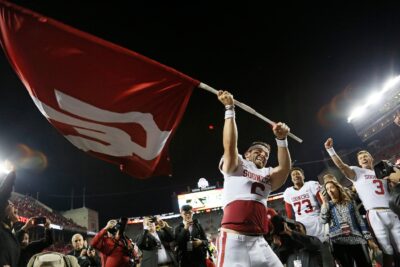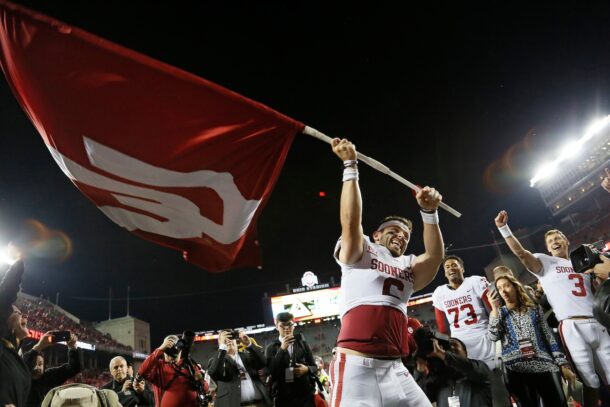
There’s one big thing that really doesn’t bode well for Oklahoma against Georgia
For now, let’s ignore the stereotypes. Let’s pretend that we’re breaking down Georgia and Oklahoma based on nothing other than 2017. That’s all well and good.
The problem is that the past year didn’t exactly shift any of those lazy, conference-wide stereotypes.
You know, like the one that says Big 12 teams don’t play defense, and they falter when the battle is decided in the trenches. There’s also the other one that says that SEC teams pound teams in the running game.
Your casual college football fan uncle probably told you that in the middle of his third glass of egg nog. He then probably used that as his reason to justify why Georgia will control the tempo and take care of Oklahoma in the Rose Bowl.
Well, he’s not exactly wrong.
Oklahoma did a lot of things extremely well to reach another Playoff semifinal. Stopping the run wasn’t one of those things. The Sooners might’ve finished 42nd against the run, but that number was a bit deceiving. What that number doesn’t show was the game flow element, which favored a Baker Mayfield-led squad that consistently lit up the scoreboard with ease against those stereotypical Big 12 defenses.
And really, how good were the running games that Oklahoma faced? Even against the quality run defenses, the numbers show that the Sooners weren’t exactly lights out.
Georgia will easily be the best run offense that Oklahoma will have faced in 2017. The combination of Nick Chubb, Sony Michel and D’Andre Swift will be a different type of challenge for a defense that faced just one Power 5 team that ranked among the nation’s top 40 rushing offenses.
Take a little closer look at those numbers and you’ll see why those lazy stereotypes could be out in full force come New Year’s Day.

Ohio State represents the only top-40 rushing offense that Oklahoma faced in 2017. For Sooners fans, that might sound like a reason they should be confident heading into the Georgia showdown.
But if you recall, Oklahoma wasn’t as stout against the run as the 31-16 score might’ve indicated. The Buckeyes still ran the ball for 4.9 yards per carry that day. If you want to take away J.T. Barrett (with his negative yardage for sacks) and just look at the numbers of tailbacks J.K Dobbins and Mike Weber, that number goes up to 6.94.
Ask any Ohio State fan about their biggest complaint that day and it’ll be that they didn’t stick to the run with their dynamic backfield duo.
If Georgia offensive coordinator Jim Chaney deviates from his backfield trio with a national championship berth on the line, he might have to walk back to Athens.
Let’s get back to that game flow element because that’s definitely important. To its credit, Oklahoma has done a fantastic job getting out to leads on teams. Mayfield gets the headlines, but that ground game with Rodney Anderson shows up ready to play on a weekly basis.
Look at how quickly Oklahoma jumped out to 3-possession leads after that Iowa State loss:
- Oct. 14 vs. Texas — 20-0, 4:32 in 2Q
- Oct. 28 vs. Texas Tech — 49-27, 1:41 in 3Q
- Nov. 12 vs. TCU — 24-7, 11:45 in 2Q
- Nov. 19 vs. Kansas — 21-3, 0:10 in 2Q
- Nov. 25 vs. West Virginia — 21-3, 13:08 in 2Q
- Dec. 2 vs. TCU — 17-0, 2:29 in 1Q
So in six of their final eight game of the season, they benefited from jumping out to those leads. Let me rephrase that. Oklahoma’s run defense* benefited.
The two games in that stretch that Oklahoma didn’t balloon it out to a 3-possession lead were Kansas State (41st rushing offense) and Oklahoma State (47th rushing offense). In those matchups — when it actually had to defend against 2-dimensional offenses — Oklahoma allowed over 6 yards per carry and 200 rushing yards in each contest.
That’s telling.
The counterargument to that is obvious. What’s to say Oklahoma can’t just jump out to a 3-possession lead against Georgia and make the run-heavy Dawgs air it out with their freshman quarterback? Well, that could happen. In fact, it happened before … once … at Auburn … when the Tigers played out of their minds.
I’m not betting on Oklahoma to jump out to a 3-possession lead against a Kirby Smart-led defense that had a month to prepare. And if it does, maybe it would be Smart who walks back to Athens.
But if 2017 is any indication, that won’t be the case. Then again, this is an entirely new challenge for Oklahoma. It never had to jump out to an early lead against a defense quite like Georgia’s. With all due respect to TCU, which had a fine season on the defensive side of the ball, the Dawgs have better coaching and more veteran playmakers capable of chasing Mayfield.
No matter what your uncle says, pre-2017 history won’t decide the Rose Bowl. Like any game, this is still all about the matchups.
Just get ready for the stereotypes. They’re coming.
Connor O'Gara is the senior national columnist for Saturday Down South. He's a member of the Football Writers Association of America. After spending his entire life living in B1G country, he moved to the South in 2015.







